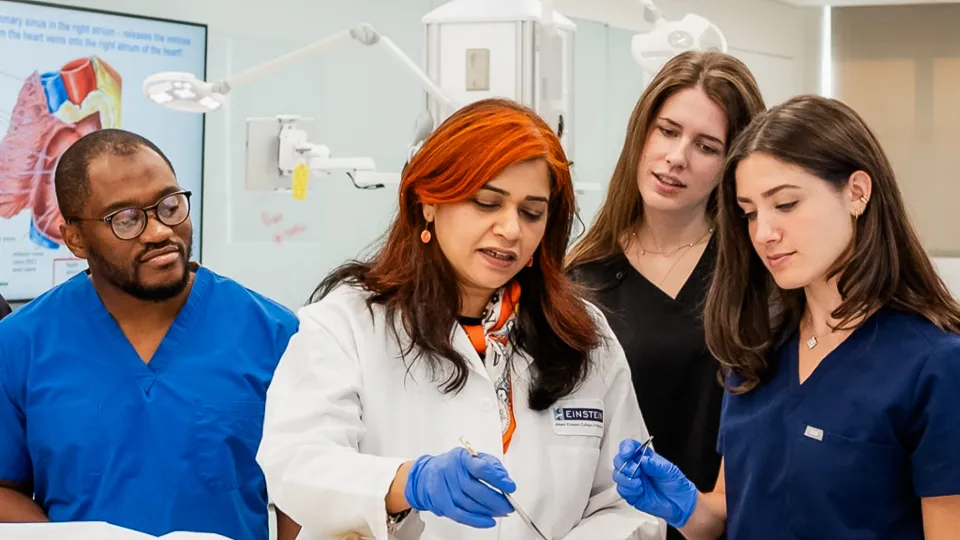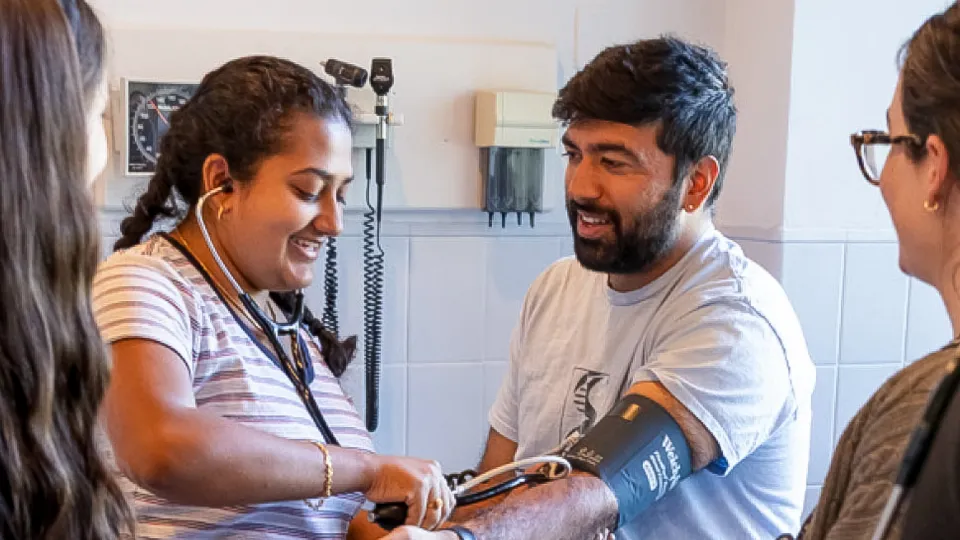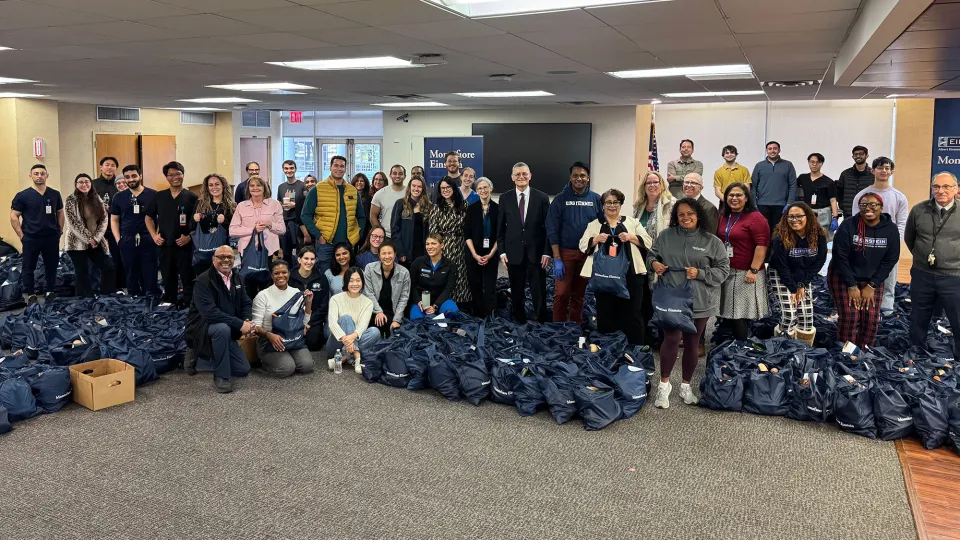Feature
BEYOND ALBERT: Training the Next Generation of Cancer Researchers
November 15, 2023
Seven high school students gained hands-on experience as cancer researchers in laboratories at Albert Einstein College of Medicine this past summer during an eight-week pathway program designed to encourage young people from the Bronx to explore biomedical careers.
Their eight-hour days were packed with activities and workshops, including sessions on becoming a “pipetting ninja,” building DNA sequencing models with LEGO® bricks, observing tiny zebrafish embryos, and learning how drugs are developed for treating diseases.
Led by Einstein Ph.D. students, postdocs, and faculty members of the National Cancer Institute-designated Montefiore Einstein Comprehensive Cancer Center (MECCC), the students mastered complex scientific topics and lab techniques as participants in the program known as BEYOND ALBERT (Bronx Einstein Youth Oncology Network Dedicated to Academic Learning, Biomedical Education and Research Training). The students, most of them rising seniors, also acquired networking and presentation skills and polished their online profiles and resumes to prepare for college—all while earning a sizable stipend. At the end of their program in late August, they presented their research at a symposium attended by faculty mentors, program leaders, and family members.

“The BEYOND ALBERT program is an important new component of the cancer center’s commitment to engage with our Bronx community and provide high-level research opportunities to young people,” said Anne Bresnick, Ph.D., associate director for cancer research training and education at MECCC. At the cancer center, Dr. Bresnick is dedicated to building opportunities for careers in science for a range of ages, and oversees other training and education opportunities, including a partnership with Lehman College of the City University of New York for Masters of Science students and ExCEL (Excellence in Career Enrichment Leadership), a career enrichment program for early-career scientists.
“These talented BEYOND ALBERT high school students demonstrated a deep passion for science and a remarkable determination to learn more each day,” said Dr. Bresnick, who is also director of the Belfer Institute for Advanced Biomedical Studies, associate dean for postdoctoral affairs, and professor of biochemistry at Einstein. “Pathway programs such as BEYOND ALBERT are essential for opening the door to scientific research for young people in our community. We hope these experiences will ignite a spark in them to pursue this path.”
Team Science, With A Side of Cookies
Students agreed a key part of BEYOND ALBERT was the steady and reassuring guidance from the program’s leader, Kristina Ames, Ph.D., assistant professor of oncology at Einstein and assistant director for MECCC's cancer research training and education program.
“Dr. Kristina helped throughout the course and made science super fun to learn in the workshops and visits to different departments,” said Raisa Karim, 17, who studied proteomics in the lab of Simone Sidoli, Ph.D., assistant professor of biochemistry at Einstein and a member of MECCC. “My PI [principal investigator] and mentors were really patient with me and explained things again and again. The networking sessions introduced me to different people and made me realize that I possibly would like to pursue a career as a researcher, which I never thought about before attending this program.”
Dr. Ames designed the curriculum and provided daily mentorship and coaching, “The whole program is built on the team science approach," said Dr. Ames. "The students learn the science together and are surrounded by people who help educate them about research, our facilities, and what it’s like to work with colleagues in a lab. We emphasize the need to ask questions, share information, and help each other analyze and explain data. It’s a powerful approach that provides the BEYOND ALBERT participants with continual feedback and drives them to succeed.”
One of the program’s five pillars is to provide college support services for high school students, which sets it apart from other high school pathway programs. As Dr. Ames noted, "We have many sessions dedicated to career and professional development, where we explain the common application, personal statements, essay-writing techniques and the importance of networking. These transferable skills will be useful throughout their professional and personal lives.”
On weekly “Cookie Wednesday” sessions, BEYOND ALBERT students looked forward to networking over chocolate chip and sugar cookies with Einstein M.D., Ph.D., and M.D./Ph.D. students, along with those in the Summer Undergraduate Research Program, a research-oriented pathway program for college students. The informal gatherings were yet another way for students to discover more about academic pursuits in science and medicine.
“I want to be a doctor and a researcher because I love the duality of helping and bonding with people while also looking for answers in a lab through experiments and results,” said Jascell Grant, 17, a student at DeWitt Clinton High School. His summer project in the lab of Eugen Dhimolea, Ph.D., assistant professor of molecular pharmacology at Einstein and a member of MECCC, focused on cancer cells that persist after treatment. “It meant the world to network with M.D./Ph.D. students and learn from their experiences.”
Stipends, Support, and Success

The Montefiore School Health Program (MSHP) was instrumental in organizing virtual high school information sessions and community focus groups to prepare for the 2022 launch of BEYOND ALBERT. Rosy Chhabra, Psy.D., community health director of MSHP, and a member of MECCC, said a meeting with Edward Chu, M.D., M.M.S., director of MECCC, and vice president of cancer medicine at Montefiore Medicine, helped lay the groundwork for establishing the program.
“Dr. Chu was deeply committed to developing a STEM research program for students living in the Bronx, and he believed we were in a prime position to help because of our working relationships with so many schools in the borough,” said Dr. Chhabra, who is also research associate professor of pediatrics and of psychiatry and behavioral health at Einstein. “After engaging with the students and their parents, we learned it was crucial for the program to offer stipends as well as vouchers for food and MetroCards for transportation. The city’s summer youth employment program offers stipends; students and parents told us it was important that BEYOND ALBERT match that amount of $2,500 to allow students to participate in a STEM enrichment program."
“It was a passion project for us,” added Angelic Rivera-Edwards, M.P.H., M.B.A., community health director of MSHP at Montefiore. “We wanted to level the playing field—to offer a valuable enrichment opportunity to a wider group of kids who historically didn’t have access to programs like this.”
In May, program leaders received a $75,000 grant from the Pinkerton Foundation to help fund this year’s stipends, food, and transportation. The grant also enabled the students to take field trips and participate in the NYC Science Research Mentoring Consortium, which comprises several programs at neighboring scientific and academic institutions.

On one of the field trips to the American Museum of Natural History, the students joined 200 of their peers on museum tours. Later in the day, they gathered under the museum’s massive blue whale model in the Irma and Paul Milstein Family Hall of Ocean Life and presented their posters to museum patrons and other students, gaining confidence in talking about their hypotheses and research methods.
“I was able to improve my scientific writing, lab work, and presentation skills,” said Abdulrahman Altairi, 16, who studied the GNMT enzyme and its role in prostate cancer in the lab of David Shechter, Ph.D., professor of biochemistry at Einstein and a member of MECCC. "I wanted to learn about cancer and why it occurs and how to help people with the disease. This research allowed me to discover new things about the world, and participating in the program helped me to decide to major in medicine."
BEYOND ALBERT Work to Continue
Six students are continuing the program this fall, which will meet weekly through the spring of 2024. For the first few months, they will work with a college coach to help prepare applications for college. Later in the semester, they will begin working together on a group project and will serve as BEYOND ALBERT ambassadors when they share their experiences with peers.
Program leaders hope to expand the number of lab opportunities next summer for Bronx students who are curious, eager to learn, and who have a deep interest in science. “On the first day, I was a little nervous and felt lost in the new environment,” said Zian Waheed, 18, who studied acute myeloid leukemia in the lab of Britta Will, Ph.D., associate professor of oncology, of medicine, and of cell biology at Einstein and co-leader of MECCC’s Stem Cell & Cancer Biology Research Program. “I wasn't sure if I was cut out to pursue this field or not. Yet on the last day, the words weren't alien to me—it was as if I was able to read a new language. The BEYOND ALBERT program shaped me to believe in myself and my abilities.”



